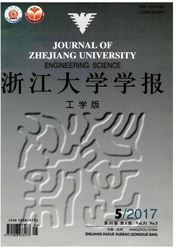

 中文摘要:
中文摘要:
针对分类阈值任意给定和临近边界区域操作工况识别可靠性低问题,提出基于贝叶斯理论的概率偏最小二乘极限学习机(p-PLS-ELM)分类算法.偏最小二乘被嵌入到极限学习机框架内,通过提取隐含层正交潜在变量,避免共线性引起输出权值系数不稳定,降低输出预报值的不确定性,改善分类编码输出预报模型的鲁棒性和稳定性.应用非线性最小二乘方法估计每类条件概率密度函数的参数,结合概率密度函数和贝叶斯定理,计算每类输出预报值后验概率作为分类可靠性测度.采用该方法在某污水处理厂进行实验验证.实验结果表明,基于概率PLS-ELM方法的污水处理操作工况识别可靠性和准确性相对优于PLS-ELM方法.
 英文摘要:
英文摘要:
Due to arbitrary setting of the classification threshold and low recognition reliability of the operating conditions near the boundary region, a probabilistic partial least square based extreme learning machine (p-PLS-ELM) classification was proposed based on Bayesian decision theory. In order to reduce the uncertainty of predicted values and achieve output prediction, the partial least squares was the robust and stable performance of classification code embedded into the extreme learning machine, which can avoid the instability of the output weight coefficients due to high collinearity by extracting a small number of the orthogonal latent variables of the hidden layer output matrix. A nonlinear least square method was proposed to estimate the parameters of the conditional probability density function for each class. Probability density function and Bayesian decision theory were applied to calculate the posterior probability of output prediction for each class, which was defined as a measure of the classification reliability. The proposed method was validated in a wastewater treatment plant. Experimental results show that the p-PLS-ELM method has a relatively high reliability and accuracy than the PLS-ELM method in the operating conditions recognition of the wastewater treatment process.
 同期刊论文项目
同期刊论文项目
 同项目期刊论文
同项目期刊论文
 FEATURE SELECTION OF FREQUENCY SPECTRUM FOR THE BALL MILL LOAD BASED ON INTERVAL PARTIAL LEAST SQUAR
FEATURE SELECTION OF FREQUENCY SPECTRUM FOR THE BALL MILL LOAD BASED ON INTERVAL PARTIAL LEAST SQUAR Selective ensemble extreme learning machine modeling of effluent quality in wastewater treatment pla
Selective ensemble extreme learning machine modeling of effluent quality in wastewater treatment pla Modeling Load Parameters of Ball Mill in Grinding Process Based on Selective Ensemble Multisensor In
Modeling Load Parameters of Ball Mill in Grinding Process Based on Selective Ensemble Multisensor In Selective ensemble modeling load parameters of ball mill based on multiscale frequency spectral feat
Selective ensemble modeling load parameters of ball mill based on multiscale frequency spectral feat 期刊信息
期刊信息
